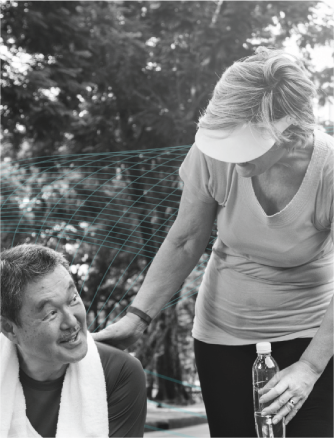Survey shows Americans overwhelmingly support wearing personal monitoring devices but only when information is shared with their healthcare professional
 REDWOOD CITY, CA, February 2, 2016 – Americans are fully prepared to take a more active role in managing their overall health and are more than willing to wear personal monitoring devices to help themselves and medical professionals improve their care. According to a national survey of 1,000 respondents commissioned by The Society for Participatory Medicine and healthcare technology company Biotricity Inc., more than 8 out of 10 consumers (84 percent) believe that tracking their own health data with a clinically accurate monitoring device will help improve their overall health.
REDWOOD CITY, CA, February 2, 2016 – Americans are fully prepared to take a more active role in managing their overall health and are more than willing to wear personal monitoring devices to help themselves and medical professionals improve their care. According to a national survey of 1,000 respondents commissioned by The Society for Participatory Medicine and healthcare technology company Biotricity Inc., more than 8 out of 10 consumers (84 percent) believe that tracking their own health data with a clinically accurate monitoring device will help improve their overall health.
The survey, which was conducted by ORC International in December 2015, cited that 71 percent of adults would use a personal monitoring device if it was clinically accurate. This comes on the heels of a recently released McKinsey & Company report, which discusses how technology is revolutionizing the understanding and treatment of disease and, in particular, how wearables are poised to transform medicine.
“Americans are tremendously in favor of technology that allows them to self-manage their chronic conditions and proactively manage and monitor their health,” said Waqaas Al-Siddiq, president and CEO of Biotricity, Inc. “Chronic illness such as heart disease has created an increasing burden to worldwide healthcare infrastructures, and preventive care is recognized as a vital component of any comprehensive healthcare service. Unlike wearables that are not capable of providing clinical-grade data, we recognize that the future lies with empowering individuals with robust self-management solutions, and we believe the survey findings demonstrate that Americans are eager to use these tools to manage their personal health issues.”
In fact, participants were in support of using a personal monitoring device that provides tracking of blood pressure, heart rate, respiratory rate, glucose, physical activity and other key assessments if it was clinically accurate and easy to use. As patients become more engaged in supervising their own health and collaborating with their healthcare professionals, the most common reasons for the 3 out of 4 who would use a personal monitoring device include:
| Reasons 75 Percent of American Adults Would Wear Personal Monitoring Devices to Manage Health | Percent of Americans |
|---|---|
| For personal use AND to share with their healthcare professional | 57% |
| For personal use only | 13% |
| For healthcare professional use only | 5% |
With the number of people being diagnosed with cardiovascular disease (CVD) at an alarming rate, clinically accurate monitoring devices can provide a much-needed solution to improve outcomes. In fact, healthcare continues to emphasize preventive care in an effort to mitigate the rising demand that the growing CVD population is placing on the system. However, traditional methods are failing to ensure that CVD patients comply with their physicians’ medical directives, including but not limited to medication adherence, dietary changes, lifestyle changes, and exercise regiments.
“Increasingly, patients are actively monitoring their own health data to better self-manage their chronic diseases and collaborate with their healthcare professionals. Self-monitoring is a vital component of an efficient and high-functioning healthcare system. This survey shows that this concept resonates with the public and that most respondents are willing to utilize technology to gather this data to improve their health,” said Daniel Z. Sands, MD, MPH, co-founder and co-chair of the Society of Participatory Medicine and a practicing physician.
About the Survey
The ORC International Telephone CARAVAN® survey was conducted December 10-13, 2015. The study was conducted using two probability samples: randomly selected landline telephone numbers and randomly selected mobile (cell) telephone numbers. The combined sample consists of 1,011 adults (18 years old and older) living in the continental United States (505 male, 506 female.) Of the 1,011 interviews, 509 were from the landline sample and 502 from the cell phone sample. The margin of error for the sample of 1,011 is +/- 3.08 at the 95% confidence level. Surveys were collected by trained and supervised US based interviewers using ORC International’s computer assisted telephone interviewing (CATI) system. Final data was adjusted to consider the two sample frames and then weighted by age, gender, region, race/ethnicity and education to be proportionally representative of the US adult population.
About Biotricity Inc.
Biotricity, Inc. is a healthcare technology company dedicated to delivering innovative, medically relevant biometric monitoring solutions that enable people to make lifestyle changes and achieve a better quality of life. The company is focused on delivering leading-edge, medically relevant biometric monitoring solutions for medical, healthcare and consumer use. To learn more, visit www.biotricity.com or follow on Twitter: @biotricity_inc Facebook facebook.com/biotricity/ or LinkedIn linkedin.com/company/biotricity-measuring-vitals.
Biotricity (OTC.QB: BTCY) expects to begin trading on the OTC Venture Marketplace (OTC QB) under the ticker “BTCY” in the next few days.
Important Cautions Regarding Forward-Looking Statements
Any statements contained in this press release that do not describe historical facts may constitute forward-looking statements. Forward-looking statements may include, without limitation, statements regarding (i) the plans and objectives of management for future operations, including plans or objectives relating to the design, development and commercialization of Bioflux or any of the Company’s other proposed products or services, (ii) a projection of income (including income/loss), earnings (including earnings/loss) per share, capital expenditures, dividends, capital structure or other financial items, (iii) the Company’s future financial performance and (iv) the assumptions underlying or relating to any statement described in points (i), (ii) or (iii) above. Such forward-looking statements are not meant to predict or guarantee actual results, performance, events or circumstances and may not be realized because they are based upon the Company’s current projections, plans, objectives, beliefs, expectations, estimates and assumptions and are subject to a number of risks and uncertainties and other influences, many of which the Company has no control over. Actual results and the timing of certain events and circumstances may differ materially from those described by the forward-looking statements as a result of these risks and uncertainties. Factors that may influence or contribute to the inaccuracy of the forward-looking statements or cause actual results to differ materially from expected or desired results may include, without limitation, the Company’s inability to obtain additional financing, the significant length of time and resources associated with the development of its products and related insufficient cash flows and resulting illiquidity, the Company’s inability to expand the Company’s business, significant government regulation of medical devices and the healthcare industry, lack of product diversification, existing or increased competition, results of arbitration and litigation, stock volatility and illiquidity, and the Company’s failure to implement the Company’s business plans or strategies. These and other factors are identified and described in more detail in the Company’s filings with the SEC. The Company assumes no obligation to update any forward-looking statements in order to reflect any event or circumstance that may arise after the date of this release.
About the Society for Participatory Medicine
The Society for Participatory Medicine (SPM) is a 501(c)(3) not-for-profit membership organization devoted to promoting the concept of participatory medicine, a movement in which activated patients engage as drivers of their health, and in which providers encourage and value them as full partners. SPM does this by fostering conversation, influencing policy, advocating research, and educating patients, health care professionals, and others. SPM members are stakeholders from across the health care continuum. Click here for more information and to join the Society for Participatory Medicine.
For further inquiries, or for a full copy of the survey results, contact: info@participatorymedicine.org.
Media Contacts
Company Contact:
Waqaas Al-Siddiq
Founder, President and CEO
Biotricity
investors@biotricity.com
McCoin & Smith Communications Inc. for Biotricity
Chris McCoin
Chris@mccoinsmith.com
508-429-5988
Richard Smith
Rick@mccoinsmith.com
978-433-3304
Investor Relations:
Biotricity Investor Relations
Investors@biotricity.com
1.800.951.3348






